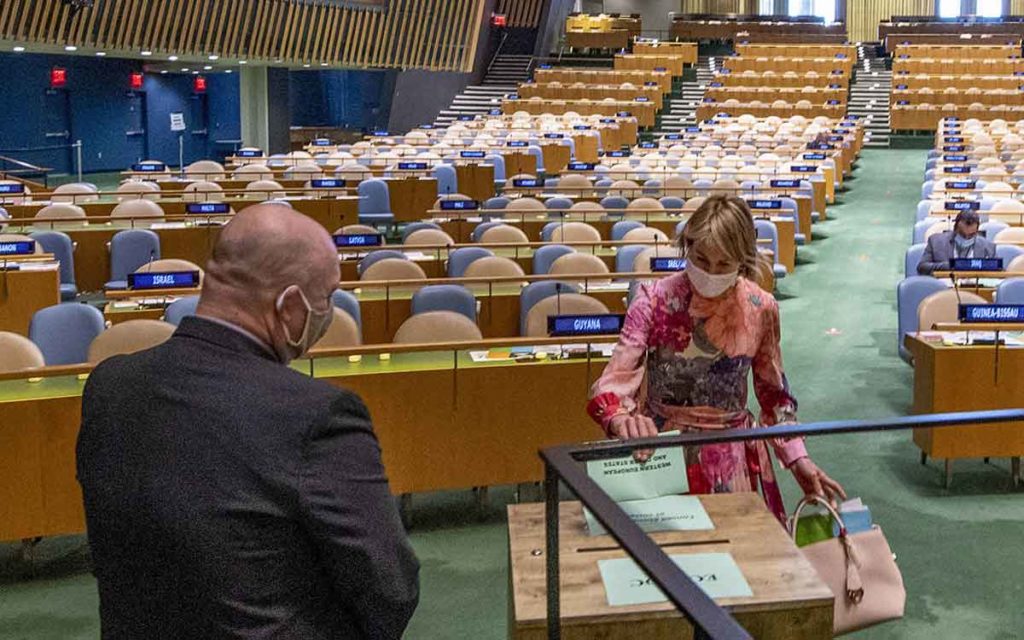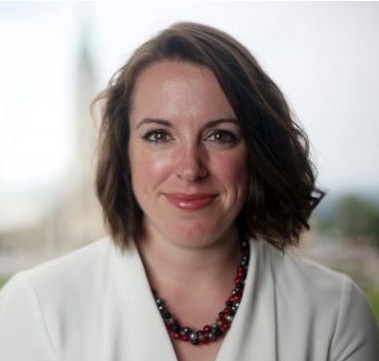
United States ambassador to the United Nations, Kelly Craft casts a vote during U.N. elections on Wednesday, June 17 at U.N. headquarters in New York. Norway and Ireland won contested seats on the U.N. Security Council Wednesday. UN Photo via AP
“Canada’s Back” … to the drawing board when it comes to international substance and swagger.
After a multi-year, multi-million dollar effort to secure a temporary seat on the United Nations Security Council, Canada lost in a contest to Norway and Ireland on Wednesday. The loss under Prime Minister Trudeau follows a failed bid to obtain a seat under former Prime Minister Harper a decade prior.
To say the country was on tenterhooks awaiting the result of the vote is an overstatement. In the days leading up to the vote, it was becoming clear that Canada was the underdog in the contest, as government representatives conditioned for a close result. The conditioning continued after the defeat, with many rushing to blame a short campaign timeline among other reasons for the loss. While the defeat caused a ripple in Ottawa, it was far from the drawn-out series of narratives that emerged when Harper’s bid was unsuccessful, then-framed as a deeply embarrassing and personal reprimand for the former Prime Minister’s foreign policy decisions.
Yet, while Harper’s loss seemed of little personal importance for a prime minister who was often skeptical of the UN bureaucracy, Trudeau’s loss must sting all the more given his personal obsession with securing a seat. The Prime Minister was directly engaged in the campaign, facilitating calls with world leaders in the weeks and days leading up to the vote. It was Trudeau who led visits to Ethiopia and Senegal in February to recruit support from African envoys for Canada’s bid. And it was Trudeau’s insistence that the “world needed more Canada”, and that he would put Canada “back” on the world stage that served as the sloganeering for the campaign. The Prime Minister’s reputation internationally was a key facet of Canada’s campaign strategy.
Perhaps the reliance on reputation and sloganeering was part of the problem. While Canada has been very vocal on economic inclusion, gender, and climate issues, the financial support behind these commitments was lacking. Foreign aid spending has only modestly increased under Trudeau, with the OECD noting that, based on GDP, it is actually below where it was in 2012. Peacekeeping contributions are equally dismal, at their lowest levels since the 1960s. For a body that is reliant on contributions from member countries to sustain their work, it should have been no surprise that dollars would go farther than dialogue on peace and security. To quote Top Gun, Canada’s international ego was writing cheques that the body wasn’t prepared to cash.
An internal review of the country’s foreign policy is inevitable now. And there’s effectively two paths the Trudeau government could take as it looks to recover from the loss.
The first looks a lot like the road that we’ve already been travelling: doubling down on climate and gender initiatives to maintain Canada’s foothold on these two policy areas. The political benefit for the Liberals in continuing with these two narratives is obvious, as they look to satisfy green-minded voters of their environmental virtues while continuing to uphold the perception that they are the primary political driver of equality for women (lest we forget the hay made over a gender balanced cabinet in 2015). While there’s domestic political advantages for these policies, the absence of an international reward for Canada’s work on these files may cause some hesitation about whether or not it’s the right focus for the country on the world stage.
The second path would involve Canada taking more definitive stands on key global security issues, and potentially opening up the wallet to engage in more UN efforts. Revisiting peacekeeping spending and perhaps contributing personnel to any of the fourteen ongoing UN missions would certainly be welcome by the UN, but may be met with controversy at home. Even outside the UN, Canada could look to chart a new course for priorities and objectives with bodies such as NATO – a move that almost certainly would require reallocation of dollars to have a splash, given we remain 20th out of 29 countries for military spending.
The instinct will be to take time to ponder this decision and weigh the political calculations of a renewed foreign policy for the Trudeau government. Canada is likely to take a pretty quiet position on foreign policy between now and the presidential election in November, given our policies are typically tied to our neighbours south of the border. The uncertainty of that election outcome when coupled with the financial repercussions of COVID-19 make a shift in foreign policy and foreign aid feel all the more unlikely in the immediate term. Throw in the minority mandate of the government and a wholesale overhaul seems an impossibility.
And while the geopolitical environment may discourage any rocking of the boat, the international threats facing Canada are mounting. China continues to be hostile toward Canada around telecom and 5G access. Russia’s Arctic aggression remains a threat to the country’s North. Even our amicable relationships will be tested; the increased polarization of the United States electorate is bound to create some very uncomfortable situations for the Prime Minister in the coming months when weighing in on the relationship with the Trump administration.
The immediacy of these threats should override the instinct for a drawn out review and inaction on foreign policy matters. If Canada spends too much time licking its wounds from the security council loss, we may find ourselves taking a licking from other global heavyweights in the process.









